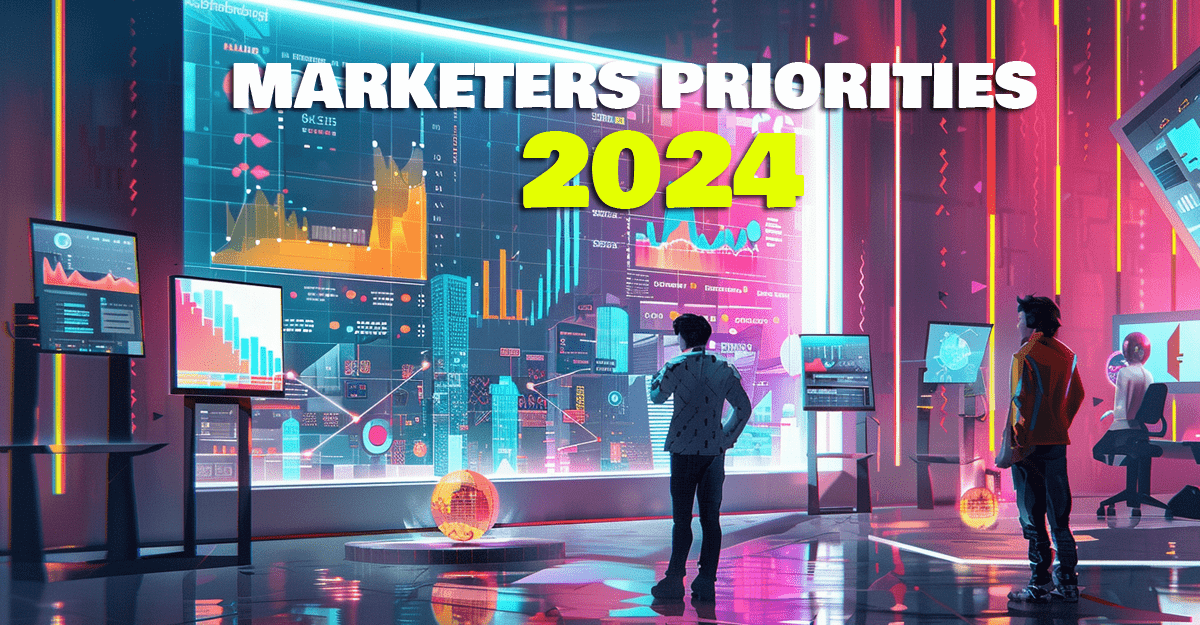Marketer Priorities 2024
The marketing landscape is constantly evolving, and 2024 is no exception. To stay ahead of the curve, modern marketers need to possess a diverse skillset that goes beyond traditional marketing tactics. According to our research, here are the key priorities for marketers in 2024:

Data-driven decision making:
As we forge ahead into 2024, the marketing landscape continues to undergo a seismic shift, moving decisively away from intuition-based strategies towards a more rigorous, data-driven approach. This evolution demands that modern marketers not only adapt but also excel in leveraging data to inform every aspect of their marketing strategies. The ability to make decisions grounded in data analysis is no longer a desirable skill—it is imperative. This comprehensive article delves into why data-driven decision making is paramount for marketers in 2024, highlighting key areas of focus such as data collection and analysis, data visualization, and effective reporting.
The Imperative of Data-Driven Marketing
The realm of marketing has traditionally been viewed as a domain where creativity and intuition reign supreme. However, the digital age has brought about a paradigm shift, placing data at the core of strategic decision making. In today's highly competitive environment, relying on gut feelings or guesswork can lead to missed opportunities and inefficient use of resources. Instead, successful marketers are those who can harness the power of data to gain insights into customer behavior, campaign performance, and market trends.
Data Collection and Analysis: The Foundation of Insightful Marketing
The first step towards becoming a data-savvy marketer is mastering the art of data collection and analysis. This involves gathering relevant data from a myriad of sources, including website analytics, social media platforms, customer feedback surveys, and CRM systems. The objective is to build a comprehensive dataset that reflects the multifaceted nature of consumer interactions with your brand.
However, collecting data is only part of the equation. The crux lies in analyzing this data to extract actionable insights. This requires a solid understanding of key marketing metrics such as website traffic patterns, conversion rates, engagement metrics, and customer lifetime value. By analyzing these metrics, marketers can identify what works and what doesn't, enabling them to optimize their strategies for better outcomes.
Data Visualization: Bringing Data to Life
Data visualization plays a crucial role in data-driven marketing. It involves creating visual representations of data, such as charts, graphs, and infographics, to convey insights in a clear and engaging manner. Effective data visualization helps break down complex data sets into understandable and actionable information. It empowers marketers to quickly grasp the implications of their data analysis, facilitating faster decision-making and more persuasive stakeholder presentations.
Reporting: Narrating the Story Behind the Numbers
The ability to report data findings effectively is another critical skill for marketers in 2024. Reporting goes beyond mere presentation of numbers; it's about telling a compelling story that highlights key insights, challenges, and opportunities. A well-crafted report communicates the results of data analysis in a way that is accessible to all stakeholders, regardless of their familiarity with data. This storytelling approach not only informs decision-making but also fosters a culture of transparency and accountability within the organization.
More information:
https://careerfoundry.com/en/courses/become-a-digital-marketer/

Creative and Digital Marketing Skills:
The modern marketer's toolkit in 2024 is multifaceted, encompassing a broad spectrum of skills that cater to the digital-first consumer landscape. At the heart of this skill set is a strong foundation in creative and digital marketing disciplines. Marketers must possess the ability to navigate the digital world with ease, employing strategies that leverage the power of social media, email marketing, and online advertising to capture the attention of their target audience.
Creative Excellence in UX Design and Multimedia Production
User experience (UX) design emerges as a critical component, with marketers needing to understand how to craft seamless and engaging digital experiences that resonate with users. This includes a keen eye for visual design, ensuring that every touchpoint, from websites to mobile apps, is visually appealing and user-friendly.
Moreover, proficiency in video and audio production is increasingly important, as content consumption preferences shift towards multimedia formats. Marketers must be adept at creating high-quality videos and podcasts that tell compelling stories, entertain, and inform their audience.
Leadership in Sales and Social Media Marketing
Leadership skills are paramount, especially in driving sales and navigating the intricacies of social media marketing. Marketers should excel in crafting strategies that not only generate leads but also build brand loyalty and community engagement through social media platforms.
Mastery of Content Creation
Content is king in the digital age, and its throne is steadfast. Marketers must excel in creating content that is not just compelling but also valuable to their audience. This includes:
- Writing: The ability to produce captivating copy across various formats—be it blog posts, email newsletters, or social media updates—is essential. Effective writing engages the reader, conveying messages clearly and persuasively.
- Visual Design: A picture is worth a thousand words, and in marketing, visually appealing content can be the difference between engaging a customer or losing their interest. Marketers need skills in graphic design to create imagery and videos that complement their written content and capture the essence of their message.
- Storytelling: The art of storytelling is paramount in connecting with audiences on a deeper, more emotional level. Through stories, marketers can weave their brand's values, mission, and vision into a narrative that resonates with consumers, fostering a stronger sense of brand loyalty.
More information:
https://www.wrike.com/marketing-guide/
https://www.smartinsights.com/content-management/content-marketing-important-ever/

The Pillars of Digital Marketing Mastery
Mastering Digital Marketing, as we have seen throughout this course, requires a diverse and multifaceted set of skills. The skills listed below are seen as the most important for the year ahead:
Search Engine Optimization (SEO):
SEO remains a cornerstone of digital marketing, emphasizing the optimization of websites and content to achieve higher rankings in search engine results pages (SERPs). In 2024, SEO extends beyond keyword stuffing and link building. It involves a deep understanding of search engine algorithms, mobile optimization, local SEO, and the importance of high-quality, relevant content. Marketers must stay abreast of the latest SEO trends and updates, ensuring their strategies align with the ever-evolving best practices.
Social Media Marketing:
The power of social media as a marketing channel continues to grow, making it essential for marketers to create and manage engaging content across platforms. The key to success in social media marketing lies in understanding the unique characteristics and audience demographics of each platform, from Instagram's visually-driven content to X's concise, conversation-focused posts. Engaging with the audience, leveraging influencer partnerships, and utilizing social media analytics tools are crucial strategies to enhance brand visibility and engagement.
Content Marketing:
The adage "content is king" holds true in 2024, with content marketing at the forefront of attracting and retaining customers. Effective content marketing involves developing and distributing valuable, relevant, and consistent content aimed at addressing the needs and interests of a defined audience. This includes a range of formats, such as blog posts, videos, infographics, and podcasts, designed to inform, educate, and entertain, ultimately driving profitable customer action.
Email Marketing:
Email marketing continues to be a powerful tool for nurturing leads and driving conversions. In 2024, personalized, targeted email campaigns that deliver timely and relevant messages to segmented audiences are more important than ever. Marketers need to master the art of crafting compelling subject lines, designing mobile-friendly email layouts, and analyzing campaign metrics to optimize performance and ROI.
Pay-Per-Click (PPC) Advertising:
PPC advertising offers a direct route to increasing visibility and driving traffic to websites. Mastery in PPC requires a deep understanding of bidding strategies, keyword research, ad copy creation, and landing page optimization. Marketers must also be adept at analyzing campaign data to continually refine and improve their PPC efforts, ensuring maximum impact and cost-efficiency.
Navigating User Behavior and Optimizing Marketing Strategies
The essence of mastering digital marketing in 2024 lies in the ability to navigate user behavior and optimize marketing strategies accordingly. Growth marketers, in particular, focus on data analysis, SEO proficiency, PPC management, technical aptitude, and conversion rate optimization. These skills enable them to understand user needs, tailor marketing messages, and deliver personalized experiences across digital channels.
More information:
https://careerfoundry.com/en/blog/digital-marketing/digital-marketing/

Agility and adaptability:
The year 2024 will see the usual combination of rapid evolution and the incessant emergence of new trends and technologies. In this landscape, agility and adaptability are not merely advantageous; they are indispensable qualities for marketers aiming to excel.
In an era where change is the only constant, the ability to be agile—swiftly responding to market shifts, consumer behaviors, and technological advancements—is paramount. Agility in marketing transcends the traditional, methodical approach, advocating for a more dynamic and responsive strategy. It involves the continuous assessment of campaigns, the readiness to implement rapid changes, and the capacity to embrace new methodologies with minimal disruption.
Key Components of Marketing Agility:
- Rapid Experimentation: Marketers must foster a culture of innovation, where testing new ideas and approaches is not only encouraged but is a standard practice. This includes A/B testing, piloting new digital marketing platforms, and exploring emerging media formats.
- Data-Driven Insights: Agility is underpinned by the ability to collect, analyze, and act on data. Real-time analytics and customer feedback serve as compasses, guiding strategic adjustments and optimizing performance.
- Flexible Planning: While long-term planning remains crucial, it should not be rigid. Agile marketers develop strategies that are both visionary and adaptable, allowing for swift pivots without losing sight of overarching goals.
The Role of Adaptability in Modern Marketing
Adaptability complements agility, focusing on the marketer's capacity to evolve in the face of changing circumstances. It's about the willingness to learn, unlearn, and relearn, ensuring that one's marketing approach remains relevant and effective.
Strategies for Enhancing Adaptability:
- Continuous Learning: Marketers must commit to lifelong learning, staying abreast of the latest trends, technologies, and best practices in digital marketing. This might involve attending webinars, enrolling in online courses, or participating in industry conferences.
- Cross-Functional Collaboration: Adaptability thrives in environments that encourage collaboration across departments. Working closely with product development, sales, and customer service teams can provide marketers with a broader perspective and deeper insights, fostering innovative solutions.
- Embracing Uncertainty: Comfort with ambiguity is a hallmark of the adaptable marketer. It involves making informed decisions in the absence of complete information and being prepared to adjust course as new data becomes available.
Cultivating a Mindset for Agility and Adaptability
The journey towards becoming more agile and adaptable is as much about mindset as it is about skill set. Marketers must cultivate a mindset that views change as an opportunity rather than a threat. This involves:
- Fostering Curiosity: Curiosity drives the exploration of new ideas and the questioning of assumptions, both critical for innovation.
- Building Resilience: The ability to bounce back from setbacks and view failures as learning opportunities is crucial for navigating the unpredictable marketing landscape.
- Encouraging Openness: A willingness to consider diverse viewpoints and experiment with new approaches can unlock creative solutions to complex challenges.
More information:
https://www.smartinsights.com/marketing-skills-development/how-best-to-learn-marketing-skills/

Consumer-Centric Approach:
At its core, consumer-centric marketing is about putting the consumer at the heart of marketing strategies and decision-making processes. It’s a strategic shift from product-focused to customer-focused planning, where understanding the consumer’s needs, desires, and behaviors becomes the foundation for all marketing efforts. This approach not only enhances customer experiences but also drives brand loyalty and long-term profitability.
Key Principles of a Consumer-Centric Approach:
- Deep Consumer Insights: Gaining a profound understanding of your target audience through data analysis, market research, and direct engagement. This includes recognizing their pain points, preferences, and behaviors across various stages of the consumer journey.
- Personalization: Leveraging consumer insights to tailor marketing messages, offers, and content to individual needs and preferences. Personalization goes beyond mere segmentation, aiming to create a one-to-one connection with consumers.
- Omnichannel Engagement: Providing a seamless and consistent consumer experience across all channels and touchpoints. This involves integrating marketing efforts across digital and traditional platforms to ensure that consumers receive the right message, at the right time, and through the right channel.
Crafting Engaging and Entertaining Content
Content is a pivotal element in consumer-centric marketing, serving as the vehicle through which brands communicate their understanding and appreciation of their consumers’ needs. Engaging and entertaining content captures attention, elicits emotional responses, and fosters a deeper connection between the brand and its audience.
Strategies for Content Excellence:
- Storytelling: Utilizing the power of storytelling to convey brand values, missions, and the benefits of products or services in a way that is relatable and compelling to the target audience.
- Interactive and Immersive Experiences: Employing interactive elements such as quizzes, polls, augmented reality (AR), and virtual reality (VR) to create immersive and memorable experiences that engage consumers on a deeper level.
- Value-Driven Content: Producing content that offers real value to consumers, be it through educational insights, practical advice, or entertainment, ensuring that interactions with the brand are meaningful and rewarding.
Optimizing Every Touchpoint for Maximum Impact
A consumer-centric approach demands meticulous attention to every touchpoint in the consumer journey, from initial awareness to post-purchase engagement. Each interaction represents an opportunity to reinforce the consumer’s decision, enhance their experience, and build lasting loyalty.
Optimization Strategies Include:
- User Experience (UX) Design: Enhancing websites, apps, and other digital platforms to ensure they are intuitive, user-friendly, and accessible, thereby reducing friction and improving satisfaction.
- Customer Service Excellence: Providing responsive, empathetic, and effective customer service across all channels to address consumer needs, resolve issues, and foster positive relationships.
- Feedback Loops: Implementing mechanisms for collecting and acting on customer feedback, allowing for continuous improvement of products, services, and experiences based on actual consumer input.
As we move through 2024, the mandate for marketers is clear: adopt and refine a consumer-centric approach that prioritizes the needs, preferences, and experiences of consumers at every stage of their journey. By focusing on deep consumer insights, personalized engagement, omnichannel consistency, and content excellence, marketers can forge stronger connections with their audiences, driving both immediate impact and sustainable growth. In an era where consumers have more choices and higher expectations than ever before, a consumer-centric approach is not just preferable—it is essential.
More information:
https://www.marketingweek.com/start-stop-continue-2024/
https://ddiy.co/growth-marketer-skills/

Strong communication and storytelling skills:
Effective communication is the cornerstone of successful marketing. It transcends the mere transmission of information to become an art form that engages, persuades, and motivates. In 2024, as consumers are bombarded with countless messages daily, the ability to communicate clearly, concisely, and compellingly is what sets successful brands apart.
Key Aspects of Effective Communication:
- Clarity and Conciseness: With the human attention span becoming increasingly limited, messages must be clear and to the point. Marketers must distill complex ideas into simple, easily digestible content that captures attention and conveys value without overwhelming the audience.
- Audience Understanding: Effective communication starts with a deep understanding of the target audience. This includes knowing their preferences, pain points, and what motivates them. Tailoring messages to resonate with specific audience segments enhances relevance and engagement.
- Consistency: Consistency in messaging across all channels reinforces brand identity and helps build trust. A consistent brand voice and message help solidify the brand’s position in the consumer's mind, making it more memorable and reliable.
The Role of Storytelling in Building Connections
Storytelling is one of the most powerful tools in a marketer's arsenal. It transforms generic messages into compelling narratives that evoke emotions, making brands more relatable and human. Stories have the unique ability to transport audiences, allowing them to see themselves in the narrative and form a personal connection with the brand.
Strategies for Effective Storytelling:
- Emotional Engagement: Successful stories tap into emotions, whether it's joy, sadness, inspiration, or nostalgia. Emotional engagement makes stories more memorable and can drive consumer action more effectively than factual statements alone.
- Authenticity: Authentic stories that reflect genuine experiences and values resonate more deeply with audiences. Authenticity fosters trust and loyalty, as consumers are more likely to engage with brands that they perceive as real and trustworthy.
- Visual Storytelling: In an increasingly visual world, incorporating images, videos, and other multimedia elements can enhance storytelling, making narratives more engaging and easier to digest.
Implementing Communication and Storytelling in Marketing Strategies
To leverage the full potential of communication and storytelling, marketers should:
- Integrate Stories into All Aspects of Marketing: From social media posts to email campaigns, every piece of content is an opportunity to tell a story. Even data can be transformed into a narrative that illustrates trends, challenges, or successes.
- Focus on the 'Why': Beyond explaining what a product or service does, focus on why it matters. Highlighting the purpose behind a brand and its offerings can create more impactful, emotionally resonant messages.
- Encourage User-Generated Content: Stories from real customers can be incredibly powerful. Encouraging user-generated content not only provides authentic narratives but also fosters a sense of community and belonging among consumers.

Project management and organizational skills:
Project management in the context of marketing involves the strategic planning, execution, monitoring, and closing of marketing activities to achieve specific objectives within a set timeframe and budget. Effective project management enables marketers to align their campaigns with overarching business goals, optimize resources, and deliver results that drive growth and brand visibility.
Key Components of Effective Marketing Project Management:
- Strategic Planning: This foundational step involves setting clear objectives, defining scope, and mapping out the sequence of activities required to achieve campaign goals. Effective planning ensures that all team members are aligned and focused on the campaign's key outcomes.
- Task Scheduling and Delegation: Organizing tasks into a coherent timeline and assigning responsibilities based on team members' strengths and capacities are crucial for maintaining momentum and ensuring accountability. Utilizing project management tools can aid in visualizing timelines and tracking progress.
- Progress Monitoring: Continuous monitoring of campaign progress against predefined milestones allows for timely adjustments and interventions. Regular status meetings and updates ensure that all stakeholders are informed and engaged throughout the campaign lifecycle.
- Risk Management: Identifying potential risks and developing contingency plans is critical for minimizing disruptions to marketing activities. This includes not only operational risks but also external threats such as cyberattacks, data breaches, and economic downturns.
Enhancing Organizational Skills for Marketing Success
In addition to project management, strong organizational skills are vital for marketers to manage the plethora of tasks, deadlines, and data inherent in modern marketing campaigns. Organizational skills enable marketers to prioritize tasks, manage time effectively, and maintain a clear overview of all campaign elements.
Strategies for Boosting Organizational Skills:
- Prioritization: With limited resources and competing demands, the ability to prioritize tasks based on their impact and urgency is essential. Techniques such as the Eisenhower Matrix can help marketers focus on what truly matters.
- Time Management: Effective time management strategies, such as time blocking and the Pomodoro Technique, can enhance productivity and prevent burnout. Setting realistic deadlines and allowing for flexibility can also improve time management.
- Digital Tools and Technologies: Leveraging digital project management tools such as Asana, Trello, or Wrike can streamline task management, collaboration, and communication. These tools offer features for task assignment, deadline tracking, and progress reporting, facilitating better organization and efficiency.
Mitigating Risks in Marketing Campaigns
Risk management is an integral part of project management and organizational skills. Marketers must stay vigilant about potential internal and external threats that could impact their campaigns. Staying informed about the latest cybersecurity measures, data privacy regulations, and market trends can help marketers anticipate and mitigate risks effectively.
- Regular Audits: Conducting regular audits of marketing processes and technologies can identify vulnerabilities and areas for improvement.
- Continual Learning: Engaging in ongoing education and training on risk management, cybersecurity, and data privacy can enhance marketers' ability to safeguard their campaigns.
More information:
https://www.wrike.com/blog/skills-marketers-resume-2024/

Understanding of new technologies:
The marketing landscape continues to be characterized by rapid technological advancements and the continuous evolution of marketing technologies (MarTech). In this environment, a marketer's ability to stay ahead hinges on their understanding and adept use of the latest tools and platforms. These technologies, designed to automate tasks, improve efficiency, and enhance decision-making, are no longer optional but essential components of a successful marketing strategy. Some of the key areas of MarTech that modern marketers need to master include marketing automation platforms, customer relationship management (CRM) software, and (as noted in #1 at the beginning of this section) data analytics tools.
Embracing Marketing Automation Platforms
Marketing automation platforms have transformed the way marketers plan, execute, and manage their campaigns. By automating repetitive tasks such as email marketing, social media posting, and lead nurturing, these platforms enable marketers to focus on strategy and creativity, significantly boosting productivity and campaign effectiveness.
Key Benefits of Marketing Automation:
- Efficiency: Automation reduces manual effort, allowing marketers to manage multiple campaigns and channels with precision and less time.
- Personalization: Advanced platforms enable personalized marketing at scale, tailoring messages to individual preferences and behaviors, thus enhancing customer engagement.
- Measurement: These tools provide robust analytics features, offering insights into campaign performance and customer interactions, facilitating data-driven decision-making.
Mastering Customer Relationship Management (CRM) Software
CRM software plays a pivotal role in managing and tracking customer interactions and data throughout the customer lifecycle. In 2024, the integration of CRM systems into marketing strategies is critical for building and maintaining strong customer relationships, streamlining processes, and driving sales growth.
Strategic Advantages of CRM Systems:
- 360-Degree Customer View: CRM systems aggregate data from various touchpoints, providing a comprehensive view of the customer journey, helping marketers tailor their strategies to meet customer needs effectively.
- Segmentation and Targeting: By analyzing customer data, marketers can segment their audience more accurately and tailor their messaging to increase relevance and engagement.
- Collaboration: CRM platforms facilitate collaboration between marketing, sales, and customer service teams, ensuring a unified approach to customer management and strategy execution.
More information:
https://www.wrike.com/blog/skills-marketers-resume-2024/
--
In essence, the marketer's role in 2024 is multifaceted, requiring a blend of creative, technical, and strategic skills, all grounded in a deep understanding of consumer behavior and the digital landscape. This mix is essential for crafting compelling campaigns, optimizing the customer journey, and achieving sustained business growth.
If you'd like to increase your understanding of marketing, and develop relevant skills for the year ahead, check out our online training courses on marketing-related topics:
NZ Digital Marketing 2024
Certificate in Digital Marketing
Digital Marketing 101
Social Media Marketing Course
AI for Marketers
Online Video Marketing
Writing for the Web
